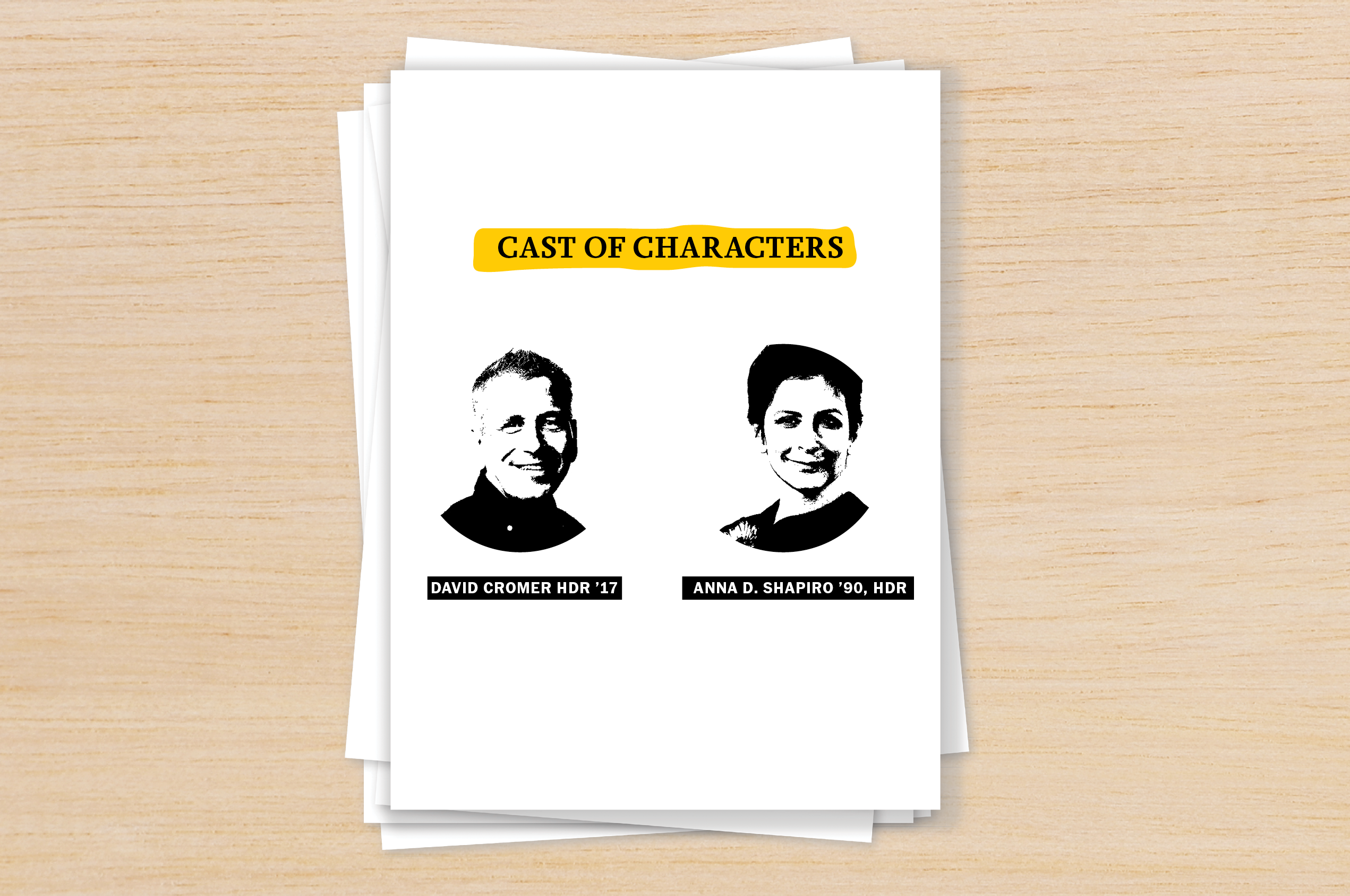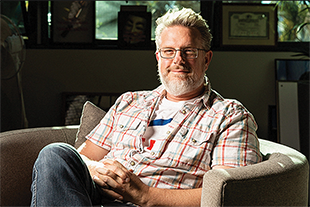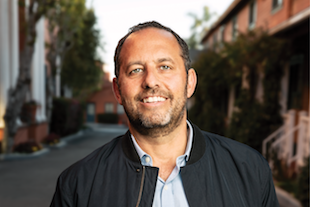From Beginning to End: A Play in Five Acts
DEMO Feature
How a friendship forged at Columbia has survived and thrived through decades of theatre and some Tony Awards.
CAST OF CHARACTERS
|
David Cromer HDR ’17 Freelance theatre director with extensive credits in Chicago and on Broadway. Winner of the 2018 Tony Award for Best Direction of a Musical for The Band’s Visit. 2010 MacArthur Fellow. Hailed by The New York Times as a “visionary wunderkind.” Stage and screen actor known for TimeLine Theatre’s 2013 production of The Normal Heart and a recurring role on Showtime’s Billions. Slated to direct Tracy Letts’ Bug at Steppenwolf Theatre in 2020. |
Anna D. Shapiro ’90, HDR ’15 Artistic Director of Steppenwolf Theatre Company, where she has spent more than two decades sharpening her directorial voice and helping shape theatre in Chicago and beyond. Winner of the Tony Award for Best Direction of the Broadway production of August: Osage County in 2008; nominated for 2011’s The Motherfucker with the Hat. Directing the upcoming musical adaptation of The Devil Wears Prada, featuring music by Elton John. Professor at Northwestern University. |
SYNOPSIS
Two old friends, Tony-winning theatre directors DAVID CROMER and ANNA D. SHAPIRO, connect via video call to reminisce about their college days as Theatre students at Columbia in the late ’80s. The conversation quickly turns to their mentor, Sheldon Patinkin, the legendary actor, director, writer, and educator who helmed Columbia’s Theatre Department for nearly 30 years. After his passing in 2014, the college dedicated the basement theater at 72 E. 11th St. in his name and created the Sheldon Patinkin Award in his honor.
SETTING
A video chat between DAVID in his NYC apartment and ANNA in her Chicago office.
TIME
A Thursday afternoon.
PROLOGUE
DEMO: Anna, in your 2015 Columbia College Chicago commencement address, you said the two of you met in Sheldon Patinkin's directing class in 1987. Maybe we could start there: What were your first impressions of each other?
Anna laughs.
DAVID: Mine was overwhelmingly positive. Right away, there were a few people I latched onto immediately, and Anna was one.
ANNA: I thought David was one of the funniest people I’d ever met. I still think it. And I don’t laugh out loud easily. But I spent that whole first year laughing out loud every day.
DAVID: I’d say Sheldon considered it a special class as well.
ANNA: I totally agree. I think that he was also kind of figuring out how to teach directing. It was a mutually beneficial relationship for all of us.
DAVID: The class was in Sheldon’s crazy eclectic mess of an office, filled with books and posters and toys. There were six of us. We smoked cigarettes the whole time.
ANNA: I think that David is probably still—and I know that I am—a good note giver. We actually wanted to help make each other’s work better, and understand what each of us was trying to accomplish. They weren’t notes about how we would have done it. They were about how the other could be successful. We learned that from Sheldon.
ACT I: SHELDON
DAVID: My college experience is ultimately characterized by a man who was just ... endlessly generous. He taught us to be generous to each other. He wasn’t into the star system, maybe because of his improv training. He was always about the ensemble.
ANNA: His ethos was a really good balance for our narcissism. It was a safe space, as the kids would say, to be full of ourselves. Sheldon never damned us for that. I think he saw it as ambition. He balanced that ambition with what we needed to learn. He was incredibly practical. I often think, “What would Sheldon want me to do right now?” Which is a lot different than saying, “What would Sheldon do?” That’s not what he taught us.
DAVID: His notes were very simple. But they were like DNA; something you could take and clone into a whole dinosaur.
(Beat)
ANNA: David, I think you showed Herculean restraint, not putting your Tony Award on the dresser right there.
(DAVID reaches out of the frame and reappears, clutching a Tony statuette.)
DAVID: (In a singsong tone) Aaanywaay ...
ANNA: (To DEMO, increduously) See? How did I ever finish school?
ACT II: BACK IN THE DAY
DEMO: What was Columbia like back then?
ANNA: We had to go to the well and pump our own water. We made our own candles and soap.
DAVID: It was small. We lived in the Theatre building, and dated everybody, and went to lunch. The third floor was this big open space ...
ANNA: I never left the 11th Street building once I went in. It was like dork summer camp. You always knew your friends would be there—a bunch of people with shared affection for something.
I still get such a visceral feeling, even when I walk in the door to the building now. It’s so different, but I have the same giddiness.
ACT III: MUTUAL ADMIRATION
DEMO: David, what's your favorite work of Anna's? And the same question to you, Anna, about David.
DAVID: August: Osage County, which I saw at least four times. Three Days of Rain, a play she did at Steppenwolf a few years ago. It was so fundamentally her. It was incredibly dense but bone-dry, witty and dark and really devastating.
ANNA: So far ... his Our Town. I am never emotionally surprised in a theater. Ever. Interestingly, I was about to direct Our Town months afterward. So I had to see his. While I’m watching, I’m thinking, “I can do this. I can come up to this level.” And then that thing* happened. Literally, my heart stopped. The image is burned in my mind.
I was like, “Wow, this [expletive] is truly a theatre artist.” It was a bittersweet feeling, because I felt him pull away from me in that moment. When you come up with someone as talented as David, you measure yourself against him. I hold myself to a high bar and he is part of that.
He also directed the best Chekhov I’ve ever seen, Three Sisters. We were, like, 24, so that pisses me off a bit, too.
(DAVID reclines on his sofa with his Tony and wiggles his bare feet.)
ANNA: (Laughing) Is there a way you can say that he did this while I was talking?
ACT IV: THEN AND NOW
DEMO: Have you ever worked together professionally?
DAVID: No, but Anna and Martha [Steppenwolf] gave me wonderful opportunities at Steppenwolf throughout the years. And I made a bit of a name for myself when I was young at Big Game Theater, which Anna ran, directing a play called Women In Water. It was very ambitious and very showy. Later that summer I worked in a dog food factory, ‘cause there’s no arriving. There’s just ... moving. Anna graciously invited me to Steppenwolf to direct a show there [Bug] next year.
ANNA: I’m so excited. We’re going to eat so much grilled cheese.
DEMO: Have you ever worked together professionally? What was it like for each of you post-college, before you hit it big?
ANNA: I went to grad school [at Yale Drama] and was hired at Steppenwolf in ’94. I didn’t have the stamina to be a freelance director like David did. I still don’t.
DAVID: I liked freelancing, but I was also doing a lot of things I didn’t want to do, which were riddled with failure and misery. You were doing something that honestly terrified me: You were committed to new plays, finding playwrights, developing them. Our artistic lives led to those choices. Our paths diverged, in terms of the tracks we took. But we’ve ended up someplace very similar, I feel.
ACT V: FULL CIRCLE
ANNA: What we both share is being really lucky, because we just kept doing what we loved, and people wanted us to keep doing it in bigger ways.
DAVID: On that level, we are in a small percentile. Because there’s plenty of better artists than me.
ANNA: Sing it, sister.
(Beat)
I don’t know where my Tony is. I’m going to have to get it out when you get here.
DAVID: (Surprised) You don’t know where it is?
ANNA: No clue. Never put it out.
DAVID: That’s—I put it out. I mean, it’s among other tchotchkes. It’s not on a plinth or anything, but ... okay, you win.
THE END.





